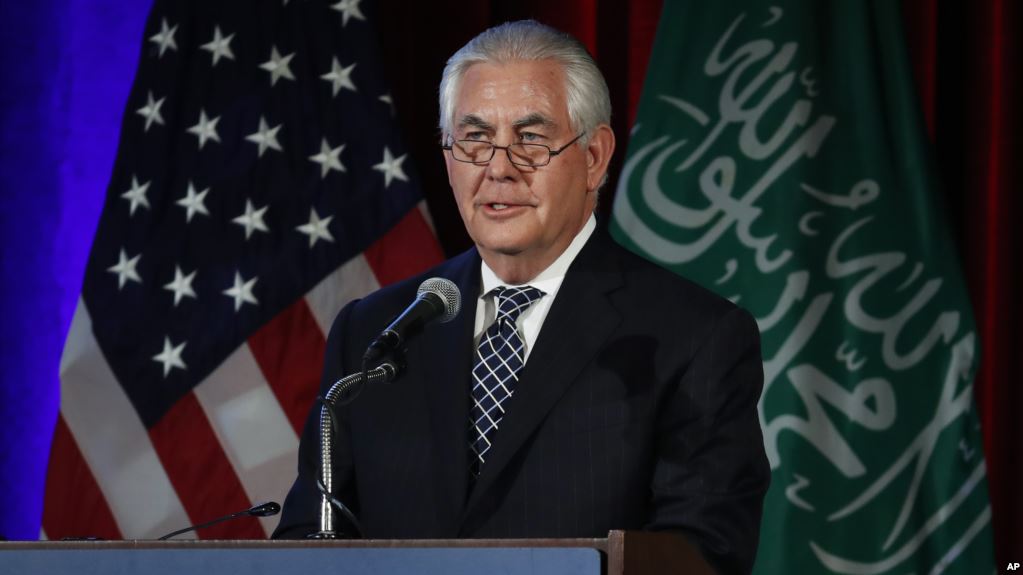Washington – US Secretary of State Rex Tillerson lauded on Wednesday historic ties between the United States and Saudi Arabia.
He also underlined his country’s commitment to facilitate US-Saudi economic relations, noting that the US would support the Saudi private sector, and hoping that the Kingdom would increase its investments in America within its Vision 2030.
Tillerson made his remarks at the second annual US-Saudi Arabia CEO Summit, which concluded Wednesday in Washington.
The summit gathered Saudi and US government officials and business leaders to discuss challenges and opportunities to expand US-Saudi economic partnership.
Participants included Saudi Minister of Commerce and Investment Majid Al-Qassabi, Chairman of Saudi Arabian Airlines and CEO of Saudi Research and Marketing Group Ghassan Al-Shibl, and Khaled Al-Seif, Vice Chairman of the Committee for International Trade.
The US Secretary of State stressed the strong partnership between Washington and Riyadh, which extends over 80 years.
“I’m pleased to be here today to reaffirm the very strong partnership that exists between the United States and the Kingdom of Saudi Arabia. We have a long relationship with Saudi Arabia that extends over 80 years, and our support for a strong and steady partner on economic cooperation remains as firm as ever,” he stated.
Tillerson talked about his several meetings with Saudi Foreign Affairs Minister Adel al-Jubeir, and his eagerness to work with Saudi Arabia to resolve problems facing the Middle East.
He added that the US Administration was committed to “using its good offices to help facilitate partnerships between American businesses and Saudi Arabia.”
“By choosing US companies for its procurement and service needs, the Kingdom will reap the benefits of what our private sector is best known for – superior technology, high quality products, creativity, professionalism, and reliable service – and importantly, partners you can count on to deliver on their commitments,” Tillerson said.
“The Saudi Government and Saudi businesses can be confident they are working with companies that abide by the highest anti-corruption standards and laws in the world,” he added.
Tillerson expressed the US support to Saudi Arabia’s Vision 2030, which he said sought to transform the Kingdom’s economy and society.
He lauded the Saudi leadership’s “specific commitments to increase foreign ownership on listed companies; to boost the women’s workforce participation rate from 22 percent to 30 percent; to augment the private sector’s contribution to GDP from 40 percent to 65 percent; to move to free market pricing in place of subsidies in energy; to raise the share of non-oil exports from 16 percent to 50 percent of non-oil GDP; and to increase dramatically the capacity and quality of the health and education sectors through substantial capital investment.”
“We encourage these kinds of reforms globally, and we certainly applaud Saudi Arabia’s leadership in pursuing this vision and economic progress for the region,” he stated.
For his part, Qassabi said the summit was aimed at creating new job opportunities and exchanging views on the means to promote economic cooperation between the US and Saudi Arabia.
He added that major investment opportunities were present in strategic fields, such as oil, energy, trade, tourism and healthcare, as well as renewable energy and construction.
The Saudi minister noted that US firms could also benefit from the privatization of Saudi companies.
President and CEO of the US Chamber Thomas J. Donohue hailed the outcome of the meeting between US President Donald Trump and Saudi Deputy Crown Prince Mohammed bin Salman last month.
He added that the two countries’ leaderships share the same geopolitical, security and economic visions, which are aimed at promoting growth rates and achieving stability.
“Strategic strength is driven by economic strength. When American businesses partner with Saudi Arabia, they help grow our domestic economy and extend influence throughout the global economy,” Donohue said in his opening remarks.
